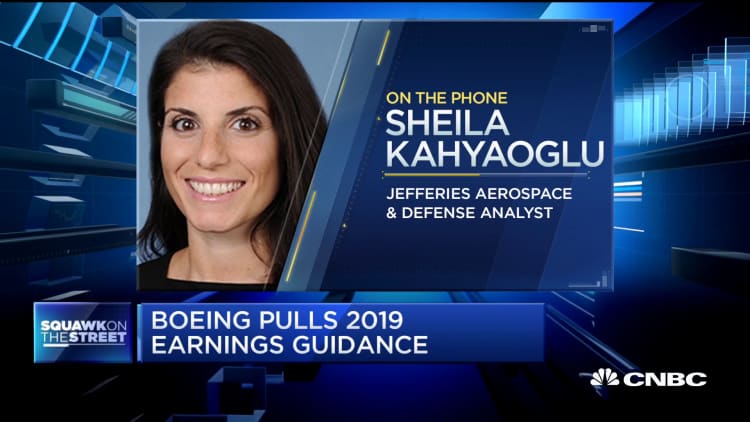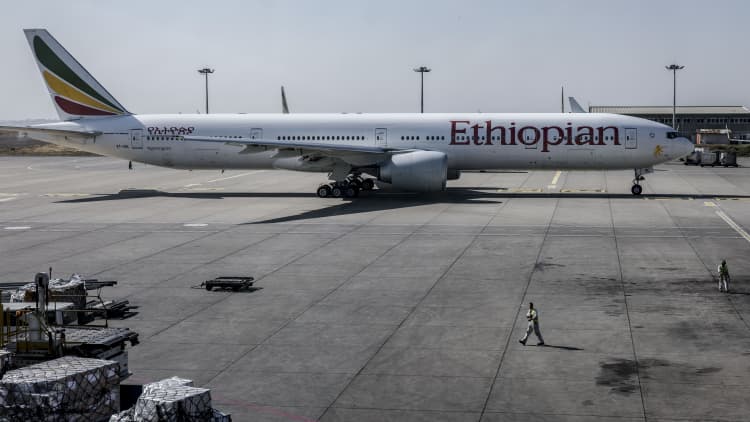
After Boeing's record-breaking 2018 results, this year is off to a rocky and challenging start as the aerospace giant's focus remains on the crisis surrounding its 737 Max aircraft.
Boeing executives spent the majority of the company's first quarter conference call with shareholders Wednesday discussing the 737 Max, which is the backbone of Boeing's commercial airplanes business. Following two deadly crashes in the span of a few months, which resulted in the deaths of 346 passengers and crew, the global fleet of Boeing 737 Max's remain grounded.
On the call, Boeing chairman and CEO Dennis Muilenburg emphasized the company's confidence in the aircraft model.
He noted that the company's total 737 program has a backlog of more than 4,400 airplane orders. Boeing estimates global demand for narrow-bodied single aisle aircraft, the 737's category, at 31,000 over the next two decades. As Wall Street analysts pressed for explanations on how the apparent flaw escaped noticed during testing and certifying Boeing's key jet, Muilenburg defended the program.
"We understand our airplane, we understand how the design was accomplished, how the certification was accomplished and we remain fully confident in the product that we put in the field," Muilenburg said. "We also know there are areas that we can improve and that is the source of the software update here.
"But there was no surprise or gap or unknown here or something that somehow slipped through a certification process," he added.
He emphasized that there was not a "technical slip or gap" in the company's engineering or development of the 737 Max. Rather, Muilenburg said both of the fatal crashes were "a series of events" and "that is very common to all accidents that we've seen in history."
Boeing has completed more than 135 flights of 737 Max aircraft with a software update that the company hopes will resolve the issues with the system that appears to be central to how the crashes happened. Muilenburg also said that 90% of the Boeing customers flying 737 Max's around the world have had representatives spend time on simulators that show how the aircraft flies with the software update.
In addition to pointing to Boeing's focus on safety as it returns the 737 Max to flight, the CEO defended the company's other business lines. He does not think Boeing is "cannibalizing" resources or personnel from other key aircraft programs as it focuses on 737 Max, as one analyst suggested. Muilenburg said he "hasn't seen any direct impact" on the development of Boeing's 777X and NMA programs.

Boeing noted in its first-quarter earnings report that the company had about $1 billion in additional costs from the 737 program. CFO Greg Smith noted that the added costs were due to the lower 737 production rate. Boeing "delivered over 50 fewer 737 aircraft in the first quarter than planned," he said. But the $1 billion does does not include "the cost to develop and test the software" being added and tested on the 737 Max planes, Smith added.
"We're taking steps amid current challenges to preserve value and growth" of the 737 program, Smith said.
Despite the airplane's integral place in Boeing's business, Smith sought to calm shareholders who may be concerned about the company's cash flow. Smith said Boeing has "healthy" business lines outside of the 737 Max, which allows the company to more easily "navigate this very challenging situation."
"We've got a lot of levers," Smith said of the company's financial position.
Regaining confidence
Muilenburg opened the conference call by declaring that safety is the company's priority. As recent reports allege Boeing has sometimes prioritized profit above quality with its airplanes, he sought to quell concerns.
"Nothing is more important to us than the safety of the flight crews and passengers who fly on our airplanes," he said.
Muilenburg said the company is working with the Federal Aviation Administration on a certification flight of the 737 Max, the next step in the process to returning the jet to the air. He said that the flight is "in the near term."
Asked by CNBC's Phil LeBeau about the company's plan to reassure fliers once the 737 Max is re-certified, Muilenburg said Boeing has a game plan that is tailored to each of its customers. He is not worried about losing any of Boeing's dozens of airline customers, saying that in the long term Boeing does not "see any change."
"A key voice in all of this will be the pilots," Muilenburg said, adding that "their voice is very important."
"We know we have some work to do to earn and re-earn the trust of our customers and the flying public in particular," he added.


